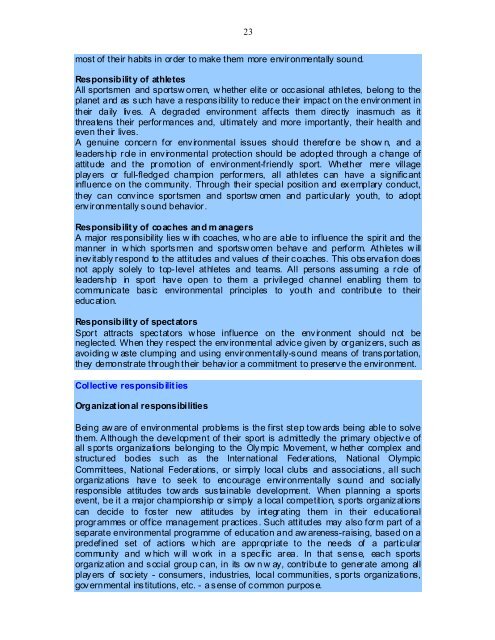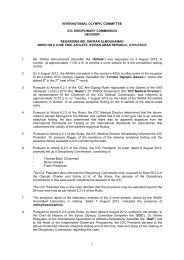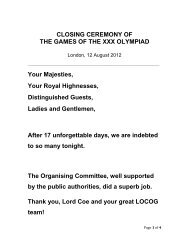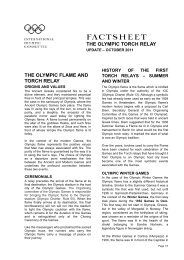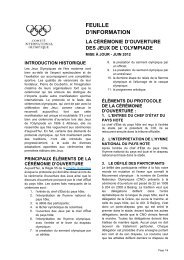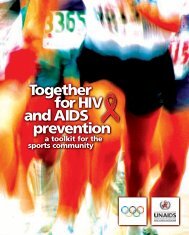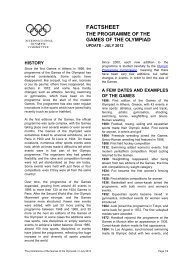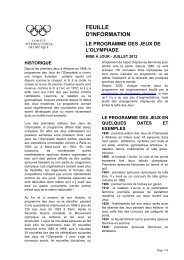MANUAL SPORT ENVIRONMENT
MANUAL SPORT ENVIRONMENT
MANUAL SPORT ENVIRONMENT
Create successful ePaper yourself
Turn your PDF publications into a flip-book with our unique Google optimized e-Paper software.
most of their habits in order to make them more environmentally sound.<br />
23<br />
Responsibility of athletes<br />
All sportsmen and sportsw omen, w hether elite or occ asional athletes, belong to the<br />
planet and as s uch have a respons ibility to reduc e their impac t on the environment in<br />
their daily liv es. A degraded environment affects them direc tly inasmuch as it<br />
threatens their performances and, ultimately and more importantly, their health and<br />
even their lives.<br />
A genuine concern for env ironmental issues should therefore be show n, and a<br />
leaders hip role in env ironmental protection should be adopted through a c hange of<br />
attitude and the promotion of environment-friendly sport. Whether mere village<br />
play ers or full-fledged champion performers, all athletes c an have a signific ant<br />
influenc e on the c ommunity. Through their special position and ex emplary conduct,<br />
they can conv inc e sportsmen and sportsw omen and partic ularly youth, to adopt<br />
env ironmentally s ound behavior.<br />
Responsibility of coaches and m anagers<br />
A major res ponsibility lies w ith coaches, w ho are able to influence the spirit and the<br />
manner in w hich sports men and sportsw omen behav e and perform. Athletes w ill<br />
inev itably respond to the attitudes and values of their c oaches. This obs ervation does<br />
not apply solely to top-level athletes and teams. All persons ass uming a role of<br />
leaders hip in sport hav e open to them a privileged channel enabling them to<br />
communicate bas ic environmental principles to youth and contribute to their<br />
educ ation.<br />
Responsibility of spectators<br />
Sport attracts spec tators w hose influence on the env ironment should not be<br />
neglected. When they respect the env ironmental advic e given by organiz ers, such as<br />
avoiding w aste clumping and using environmentally-s ound means of trans portation,<br />
they demonstrate through their behav ior a commitment to preserv e the environment.<br />
Collective responsibilities<br />
Org anizat ion al responsibilities<br />
Being aw are of environmental problems is the first step tow ards being able to solve<br />
them. A lthough the development of their sport is admittedly the primary objectiv e of<br />
all s ports organizations belonging to the Oly mpic Movement, w hether complex and<br />
structured bodies s uch as the International Federations, National Olympic<br />
Committees, National Federations, or simply local clubs and associations , all such<br />
organiz ations hav e to seek to enc ourage environmentally s ound and soc ially<br />
responsible attitudes tow ards sus tainable development. When planning a sports<br />
event, be it a major championship or s imply a local competition, s ports organiz ations<br />
can decide to fos ter new attitudes by integrating them in their educational<br />
programmes or office management practices . Such attitudes may also form part of a<br />
separate environmental programme of education and aw areness-raising, based on a<br />
predefined set of actions w hich are appropriate to the needs of a partic ular<br />
community and w hich w ill w ork in a s pec ific area. In that s ens e, eac h sports<br />
organiz ation and s ocial group c an, in its ow n w ay, contribute to generate among all<br />
play ers of soc iety - consumers, industries, local communities, s ports organizations,<br />
gov ernmental ins titutions, etc. - a s ense of c ommon purpos e.


